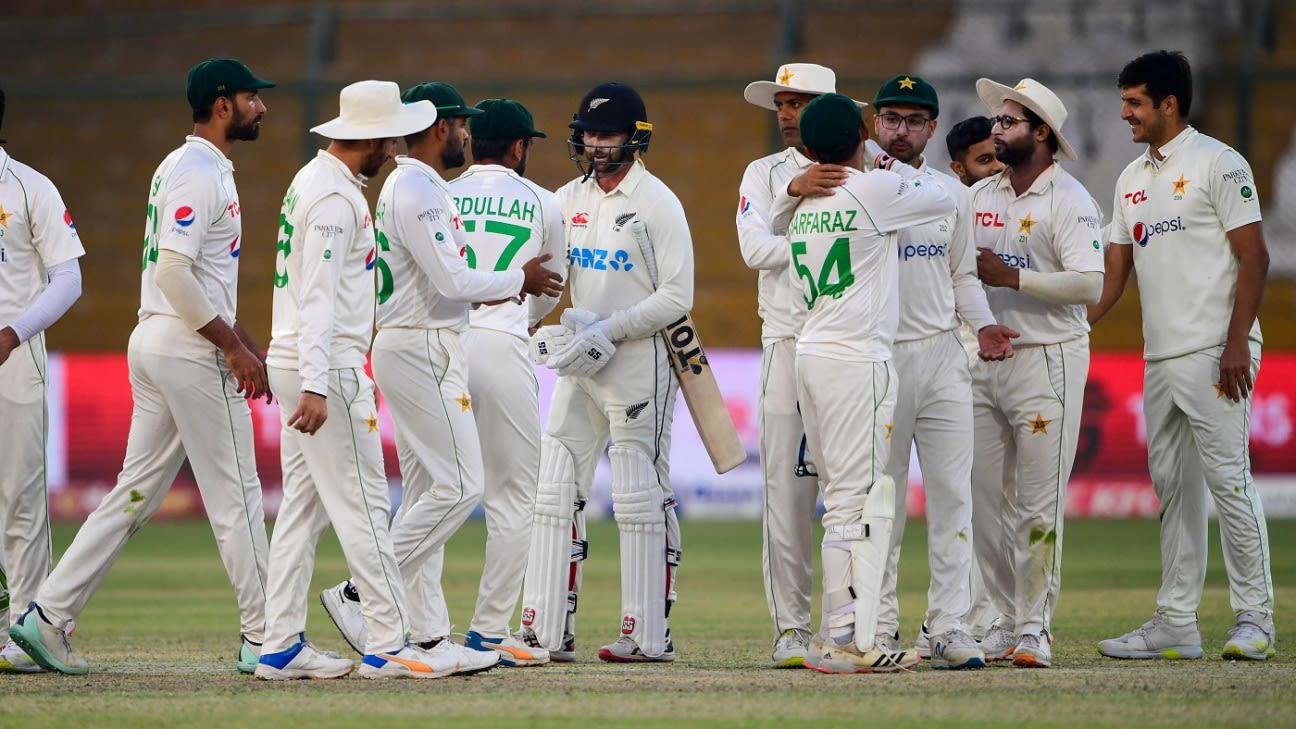Not that it meant an inevitable draw, though. According to Babar, the point of the declaration was the same as the point of any declaration: to win the game.
“Saud was a bit shocked when we declared,” Babar grinned afterwards. “He thought we were going for a draw.”
But for a brief period during that final innings at dusk, there weren’t many smiles on Pakistani faces. A first-over wicket had given way to an onslaught against spin from Tom Latham, and by the end of the sixth over, New Zealand had piled on 55. It was a rate that was sufficient to see them through to victory if the full 15 overs available when the chase began were to be bowled. With the light deteriorating rapidly, though, that was effectively impossible.
Babar turned to the fast bowlers and, 2.3 overs into spin being taken off, the umpires decided it was much too dark. With it, a slightly surreal piece of final-day Test cricket came to an end.
“We said we’d go after a result,” Babar said after the match. “We took a chance, you never know. It’s cricket. Anything can happen. Saud and [Mohammad] Wasim Junior’s partnership was vital for us because it brought us into the game. That put the idea in my head that we could declare. You all will have enjoyed it as well, and it surprised everyone. It was in our mind we’d take a chance because anything can happen.
“We sent a message in, just before we declared, to tell the batters to assess the conditions and play according to those. At times you have to take brave decisions and take chances. As a team and captain, I try and do that. You plan for a result, even if you can’t guarantee it.”
It’s not clear whether the decision to declare came from Babar himself. If it did, it would certainly be a break from historical precedent; Babar the captain has tended to err on the side of caution. Besides, the chances of a Pakistan win were so remote it’s impossible not to wonder if Babar had his tongue firmly in cheek when talking them up. New Zealand had, after all, kept Pakistan out in the field for nearly 195 overs in the first innings and still hadn’t been bowled out. The thought that it might take fewer than 10-15 overs in the second seemed fanciful at best.
“It’s not that we need to play different cricket,” Babar said. “We need to take things session by session and day by day. We need to be positive and play with aggression. We’re working on it. Everyone has a different game and mindset. We need to credit New Zealand with the way they played and dominated.
“We lost three early wickets but we came back after that. Salman Ali Agha deserves credit for the way he batted with the tail [in the first innings] and put us in a good position. Imam [ul-Haq], Sarfaraz [Ahmed] and Saud Shakeel built partnerships in patches in the second innings, and Wasim chipped in as well. So the batting line-up did quite well.
“As a coach and captain we can ask for what kind of wicket you need. You know spinners dominate there and reverse swing from the fast bowlers gives you an edge. The fast bowlers bowled well. Mir Hamza bowled well and there were lots of close appeals on his bowling, which also created chances. You don’t always get what you want but the conditions are the same for both sides.”
Danyal Rasool is a sub-editor at ESPNcricinfo. @Danny61000
